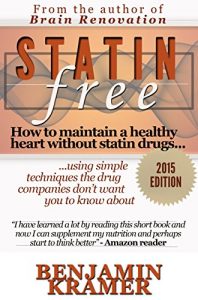For some people, statins can be a life-saving medication.
However for others, statins are at best, ineffective in preventing cardiovascular events like heart disease and heart attacks and at worst, cause debilitating and intolerable side effects such as type 2 diabetes, incapacitating muscle soreness and memory problems.
There is a simple fact, shown in every major review on the effectiveness of statins, that your doctor will no doubt know - If you have already had a heart attack, you should, almost definitely, be taking statins. Statins have been proven to save lives in this scenario. However, if you simply have high cholesterol with no other signs of heart disease or have not already had a heart attack, statins not only show little to no benefit, they can also cause side-effects like type 2 diabetes (Ironically, type 2 diabetes is a significantly greater risk factor for heart disease than elevated cholesterol).
Added to this, statins block a vital biological pathway inside your body for creating important substances for your heart, such as co-enzyme Q10 (co-Q10). Yes, you read that correctly. Statins block a substance which itself is associated with improving cardiac health.
So, if you have decided (after consultation with your doctor) to either stop taking statins, or you want to help prevent cardiovascular problems without resorting to statins, this guide has been created with YOU in mind, featuring -
- What are statins, what are their side effects and how do they work?
- What is "high cholesterol" and why is (or isn't) it important?
- What is LDL, HDL and triglycerides?
- Natural alternatives to statins including - diet, exercise, stress reduction and potent supplements
If you are about to embark on your drug-free, heart-healthy future, this guide will give you all the information you need to know to take charge of your cardiovascular health. Whatever decision you make, make sure it is an informed one, based on your own research. This guide by Benjamin Kramer is your perfect starting point.
However for others, statins are at best, ineffective in preventing cardiovascular events like heart disease and heart attacks and at worst, cause debilitating and intolerable side effects such as type 2 diabetes, incapacitating muscle soreness and memory problems.
There is a simple fact, shown in every major review on the effectiveness of statins, that your doctor will no doubt know - If you have already had a heart attack, you should, almost definitely, be taking statins. Statins have been proven to save lives in this scenario. However, if you simply have high cholesterol with no other signs of heart disease or have not already had a heart attack, statins not only show little to no benefit, they can also cause side-effects like type 2 diabetes (Ironically, type 2 diabetes is a significantly greater risk factor for heart disease than elevated cholesterol).
Added to this, statins block a vital biological pathway inside your body for creating important substances for your heart, such as co-enzyme Q10 (co-Q10). Yes, you read that correctly. Statins block a substance which itself is associated with improving cardiac health.
So, if you have decided (after consultation with your doctor) to either stop taking statins, or you want to help prevent cardiovascular problems without resorting to statins, this guide has been created with YOU in mind, featuring -
- What are statins, what are their side effects and how do they work?
- What is "high cholesterol" and why is (or isn't) it important?
- What is LDL, HDL and triglycerides?
- Natural alternatives to statins including - diet, exercise, stress reduction and potent supplements
If you are about to embark on your drug-free, heart-healthy future, this guide will give you all the information you need to know to take charge of your cardiovascular health. Whatever decision you make, make sure it is an informed one, based on your own research. This guide by Benjamin Kramer is your perfect starting point.






